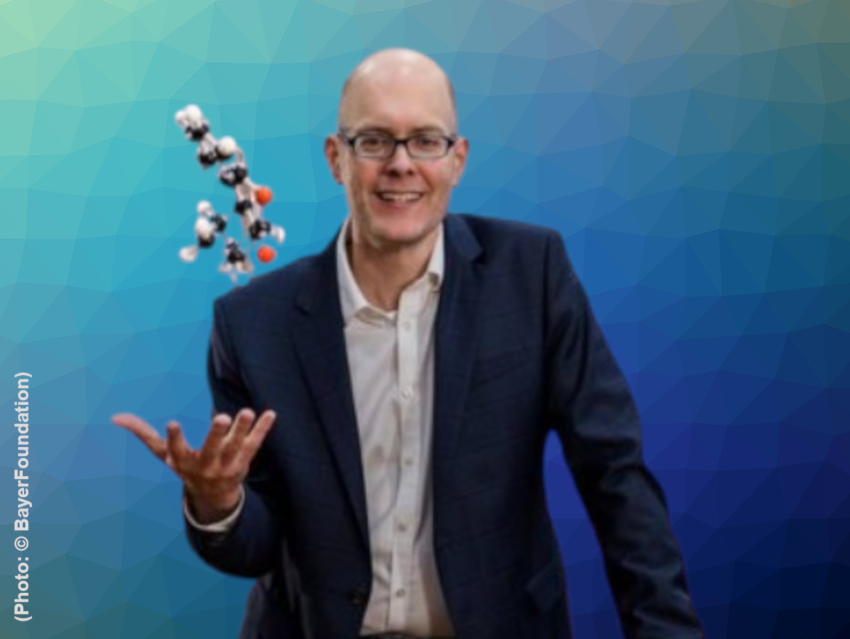Frank Glorius, University of Münster, Germany, has received the Emil Fischer Medal 2024 from the German Chemical Society (GDCh). The award, which honors outstanding achievements in the field of organic chemistry and is endowed with EUR 7,500, was presented at the ORCHEM conference in Regensburg, Germany, on September 9, 2024.
Frank Glorius received the award for his groundbreaking contributions to organic synthesis methodology and the design of functional molecules. He has made important contributions to organic synthesis and catalysis and is involved in the evaluation and discovery of chemical reactions as well as the prediction of reactivity and selectivity based on machine learning.
Frank Glorius was born in Walsrode, Germany, in 1972. He studied chemistry at the University of Hanover, Germany. Frank Glorius completed his Ph.D. at the University of Basel, Switzerland, after research work there and at at the Max Planck Institute for Coal Research, Mülheim an der Ruhr, Germany. After postdoctoral studies at Harvard University, Cambridge, MA, USA, independent research at the Max Planck Institute for Coal Research, and work at the University of Marburg as Professor of Organic Chemistry, Germany, he moved to the University of Münster in 2007 as Full Professor of Organic Chemistry.
Among many other honors, as well as multiple ERC (European Research Council) grants, Glorius has received the BASF Catalysis Award in 2005, the AstraZeneca Award in Organic Chemistry in 2009, the Gottfried Wilhelm Leibniz-Award in 2013, the Mukaiyama Award from the Society of Synthetic Organic Chemistry, Japan, in 2017, the Merck, Sharp & Dohme Award from the Royal Society of Chemistry (RSC) in 2018, the Mitsui Chemicals Catalysis Science Award in 2020, and the Janssen Price for Creativity in Organic Synthesis as well as the Otto Bayer Award from the Bayer Foundation in 2022.
Glorius is a Member of the Academia Europaea and the German National Academy of Sciences Leopoldina, as well as an Honorary Member of the Israel Chemical Society (ICS). He is actively involved in the chemical community, for example, on the Board of Trustees of the German Chemical Industry Fund (Fonds der Chemischen Industrie, FCI) and in the Chemistry Review Board of the German Research Foundation (Deutsche Forschungsgemeinschaft, DFG).
Selected Publications
- Nitrogen-to-functionalized carbon atom transmutation of pyridine,
Fu-Peng Wu, Madina Lenz, Adhya Suresh, Achyut R. Gogoi, Jasper L. Tyler, Constantin G. Daniliuc, Osvaldo Gutierrez, Frank Glorius,
Chem. Sci. 2024.
https://doi.org/10.1039/d4sc04413d - Switchable and Chemoselective Arene Hydrogenation for Efficient Late Stage Applications,
Fuhao Zhang, Himadri Sekhar Sasmal, Debanjan Rana, Frank Glorius,
J. Am. Chem. Soc. 2024, 146, 18682–18688.
https://doi.org/10.1021/jacs.4c05883 - Alkyne-tagged imidazolium-based membrane cholesterol analogs for Raman imaging applications,
Constanze Schultz, Tristan Wegner, Corinna Heusel, Tim Gallagher, Yanjun Zheng, Markus Werner, Seraphine V. Wegner, Tobias Meyer-Zedler, Oliver Werz, Michael Schmitt, Juergen Popp, Frank Glorius,
Chem. Sci. 2024.
https://doi.org/10.1039/d4sc03155e - An overview of N-heterocyclic carbenes,
Matthew N. Hopkinson, Christian Richter, Michael Schedler, Frank Glorius,
Nature 2014, 510, 485–496.
https://doi.org/10.1038/nature13384 - C–H bond activation enables the rapid construction and late-stage diversification of functional molecules,
Joanna Wencel-Delord, Frank Glorius,
Nat. Chem. 2013, 5, 369–375.
https://doi.org/10.1038/nchem.1607 - Beyond Directing Groups: Transition‐Metal‐Catalyzed C–H Activation of Simple Arenes,
Nadine Kuhl, Matthew N. Hopkinson, Joanna Wencel‐Delord, Frank Glorius,
Angew. Chem. Int. Ed. 2012, 51, 10236–10254.
https://doi.org/10.1002/anie.201203269




